American English is full of flavorful food idioms that we use on a daily basis. We don’t question them in America, but some of them are actually pretty strange especially if you try to translate them.
To find out just how random these phrases are, I’ve asked two of my friends from France, Marianne and Orlane, to guess the meanings of some American food idioms. Sometimes you need a French perspective to tell you when something doesn’t make any sense.
Note: Some of the comments have been translated from French into English for ease of reading. English translations of French idioms are in parentheses after the phrases.
1. It’s as easy as pie.
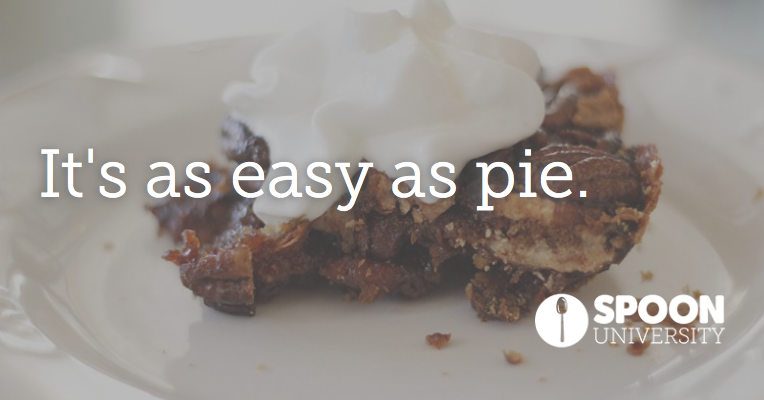
Photo by Jessica Payne
Marianne: I would say that it means that it’s really really easy! In French we would say, “C’est du gâteau.” (It’s cake.)
Orlane: Well this one’s easy as pie!! “Simple comme bonjour” (simple as hello), as we would say in French.
What it actually means: When something is very easy to do.
Apparently cake is a universal thing because they were both were spot on. In the U.S. we use the phrases “it’s a piece of cake” and “it’s as easy as pie” interchangeably. I suppose that pie has the Americana vibe going for it, but it seems cake is the way for international diplomacy.
2. (To) go bananas.
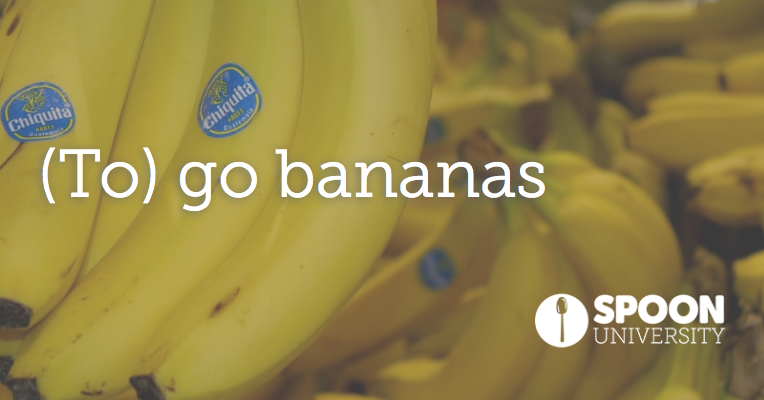
Photo by Julie Haupin
Marianne: Never heard, but I guess it means “go crazy”?
Orlane: I guess I’ve heard that one before. I feel like it means getting crazy or something. For some reason I imagine people dressed up like bananas, going crazy and screaming at each other. My imagination’s getting weird. (I swear I didn’t take anything!)
What it actually means: To go crazy.
This one seems pretty easy to understand. It does seem a little unfair to make the mental jump from bananas to monkeys to insanity, but apparently both cultures do it. Also, let’s take a moment to appreciate Orlane’s fabulous imaginative skills.
3. (You are) the apple of my eye.
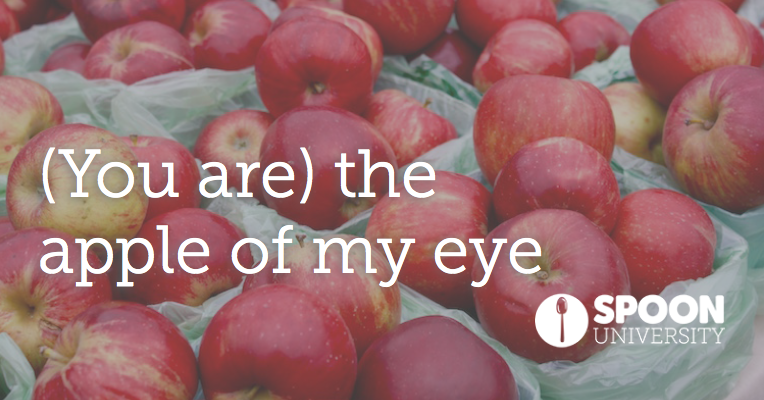
Photo by Meredith Ross
Marianne: Never heard of it, it’s difficult to guess.
Orlane: This one’s probably my favorite. I think it’s so cute! We have a similar expression, “(tu es) la prunelle de mes yeux.” (Basically you’re the apple of my eye, but prunelle means “sloe,” a fruit similar to a plum.)
What it actually means: Someone that one likes a lot.
So this is the old-fashioned version of “bae.” Similar to the “easy as pie” scenario above, this food idiom also draws on classic Americana. What’s more American than a good and wholesome red apple?
4. (To be) full of beans.
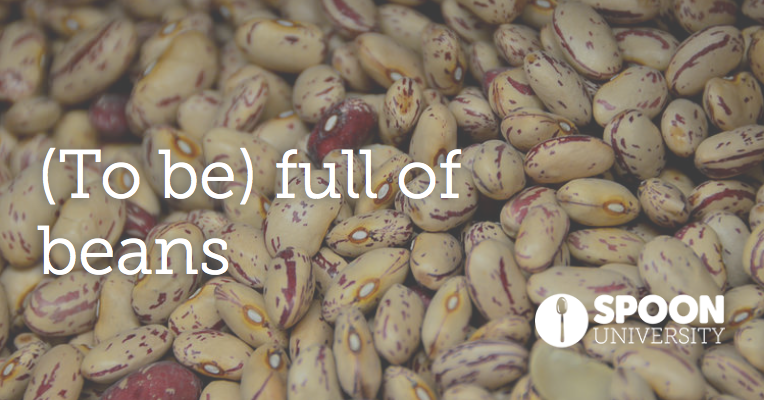
Photo by Kathleen Lee
Marianne: Never heard, but I guess it means “to have eaten too much”? Like in French, “J’ai la peau du ventre bien tendu.” (In the french phrase, it means your stomach is so stretched full of food that it’s taut.) But we don’t say that often.
What it actually means: To be full of energy OR a nicer way to say someone is full of shit.
Marianne’s response makes a lot of sense. “You’re full of beans” should be the appropriate comment to make to your friend after witnessing them devour a burrito bowl. Alas, for some reason we have idiomatically tainted beans as a food associated with lying and gossiping. (See below.)
5. (To) spill the beans
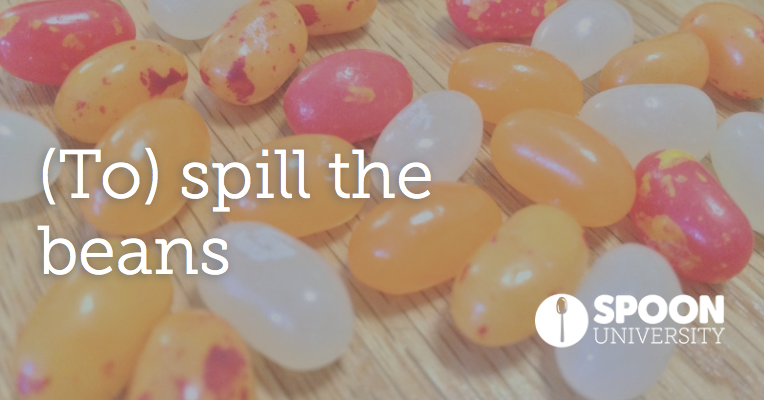
Photo by Devon Russell
Marianne: Don’t really know this one…
Orlane: In French we have a similar expression! “Cracher le morceau.” (To spill; “morceau” is like a piece of food.)
What it actually means: To disclose something confidential.
Here we go with the beans again. Apparently being full of beans isn’t a desirable state to be in, and neither is spilling the beans. Moral of the story is just to stay away from the beans.
6. (To) butter somebody up.

Photo by Kristin Arbutina
Marianne: Never heard it, but I guess it means in French, “brosser quelqu’un dans le sens du poil”? (To rub someone the right way.) Maybe, make someone appreciate you by telling them nice things.
Orlane: So I admit that I’ve never heard this! Let’s see, what could it mean…“brosser quelqu’un dans le sense du poil”? (to rub someone the right way.) To be hypocritical? Even though it wouldn’t be very nice to be buttered up (unless you were getting a massage at the same time!), in this case I think it could mean to tirelessly question someone to obtain information. In French we say, “cuisiner quelqu’un.” (To grill someone.)
What it actually means: To flatter someone to try to get their favor or friendship.
It’s odd that the French don’t have a butter-based expression for getting on someone’s good side. Though a possible reason could be because butter is a staple ingredient in French cuisine and therefore buttering someone up would not be anything out of the ordinary.
7. Have your cake and eat it too.

Photo by Kelda Baljon
Marianne: “Occupe toi de tes oignions”? (Literally translates as “mind your own onions,” but in English we would say “mind your own business.”)
Orlane: I don’t know this expression, but it makes me think of we say in French, “vouloir le beurre et l’argent du beurre” (to want the butter and the money for the butter), which means that you can’t have everything!
What it actually means: That one cannot or should not try to have two incompatible things. (Because you can’t simultaneously eat your cake and still possess it in its uneaten form.)
It seems the French have the same expression, only slightly nuanced. The two desires in conflict for the French are money and butter. For the Americans, gluttony and cake. Isn’t culture great? Marianne missed the mark on this one, but her answer is still intriguing.
It’s interesting that the American version, “mind your own business,” prioritizes business as the principal thing to be worried about, whereas the French version values the importance of a person’s onions. Any foodie would agree; onions are the priority.
8. (To) have all your eggs in one basket.
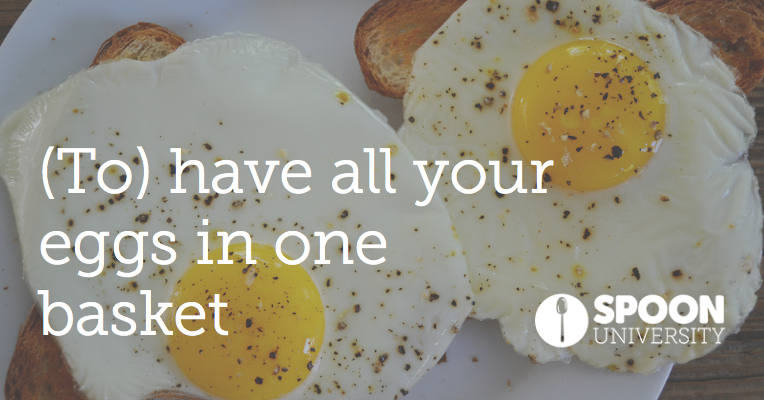
Photo by Megan Prendergast
Marianne: Oh, we have this one in French too: “Mettre tous ses oeufs dans le même panier.” (To put all your eggs in the same basket.)
Orlane: “Il ne faut pas mettre tous les oeufs dans le même panier.” (You mustn’t put all your eggs in the same basket.)
What it actually means: To risk everything on one person or thing.
Everyone understands the fragility of eggs, and their own clumsiness when it comes to basket-holding. This is what one calls a universality, my friend.
9. There’s no use crying over spilt milk.
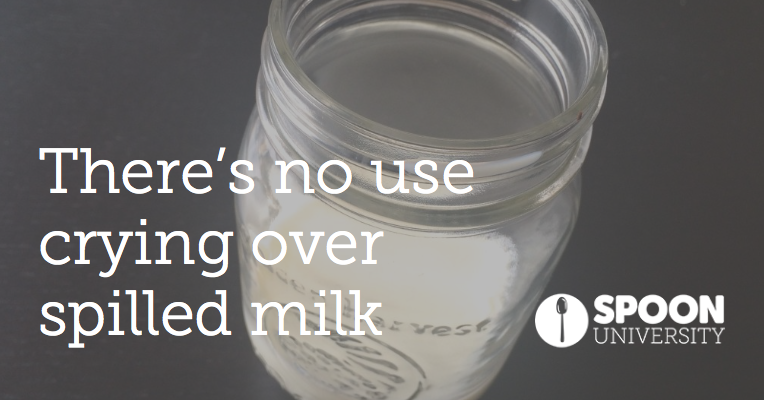
Photo by Helena Lin
Marianne: I have heard this one before! No need to cry for something already done! In French we say, “Ce qui est fait est fait.” (What’s done is done.)
Orlane: We have the same expression in French, but we don’t use it very much. Anyway, whoever came up with this expression definitely wasn’t a student. Given the price of milk, when you’re a student you wouldn’t lose a drop of it.
What it actually means: There’s no need to cry or complain about something that has already happened.
The French version, ce qui est fait est fait, means “what’s done is done.” It has more Macbeth-esque gravitas than the American idiom, whose only allusion is to the dairy aisle.
10. To have a bun in the oven.
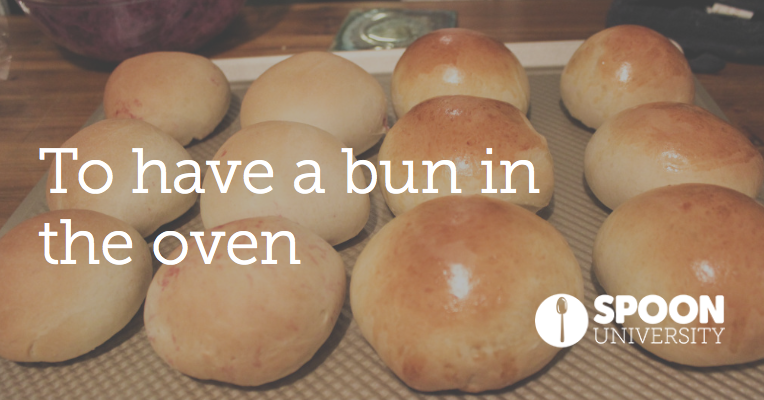
Photo by Catherine Vo
Marianne: Don’t understand those words.
What it actually means: To be pregnant.
I hardly understand these words either, Marianne. This food idiom seems like something straight out of a 1950’s book on the birds and the bees.
11. To sell like hot cakes.

Photo by Malia Hu
Marianne: ???
Orlane: I’ve never heard this of this, but in French we have the expression, “se vendre comme des petits pains” (to sell like little breads) to describe something that sells very well very quickly. So I guess they’re the same!
What it actually means: To sell quickly.
Public Service Announcement: hot cakes and pancakes are the same thing. I guess the French wouldn’t make the association between pancakes and a high consumer demand, since crêpes are more their style.
This saying really just makes me want to find a pancake food truck because now all I have is an image in my head of hot cakes flying off a griddle at record speeds and ending in my belly (not like that bun/oven scenario, just to be clear).
12. Cool as a cucumber.
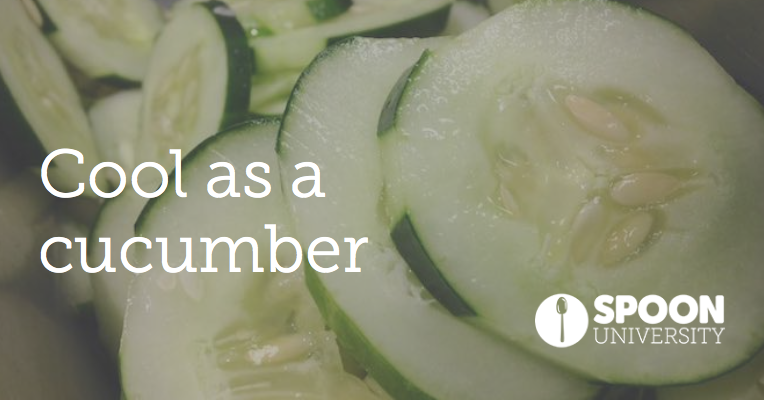
Photo by Haliana Burhans
Marianne: To be uncool?
What it actually means: To remain calm under pressure.
I suppose “cool as cucumber” could be used in an ironic way, and then Marianne would be right about it indicating a certain level of uncoolness. But mostly we play it straight with this phrase, no matter how dorky it is.
13. (To have) bigger fish to fry.
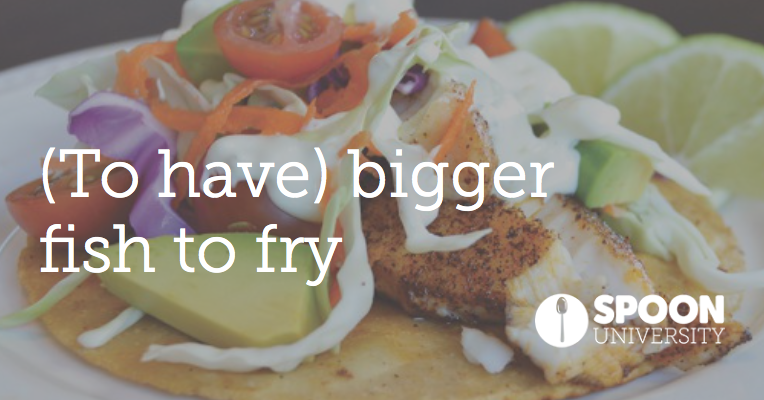
Photo by Maddy Shannon
Marianne: “Avoir les yeux plus gros que le ventre” (to have eyes bigger than your stomach), maybe?
What it actually means: To have more important things to do.
There must be an equivalent French phrase for this, and if there isn’t then there needs to be. I’m sure situations arise all the time at the préfectures when your average citizen decides it isn’t worth it to try and explain their bureaucratic nightmare to the civil servant before them – because they have bigger fish to fry higher up in the French government.
14. Sour grapes
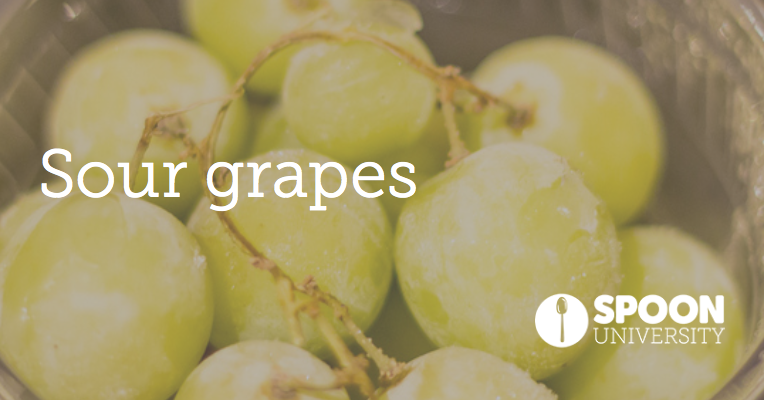
Photo by Lisa Gong
Orlane: No idea, haha! But it can’t be something very nice, I’m guessing!
What it actually means: When someone is disparaging about something just because they can’t have it.
You’re right Orlane, having sour grapes isn’t very nice. Though I’m a bit surprised no references to wine were made, because that would’ve been the icing on the cake.


